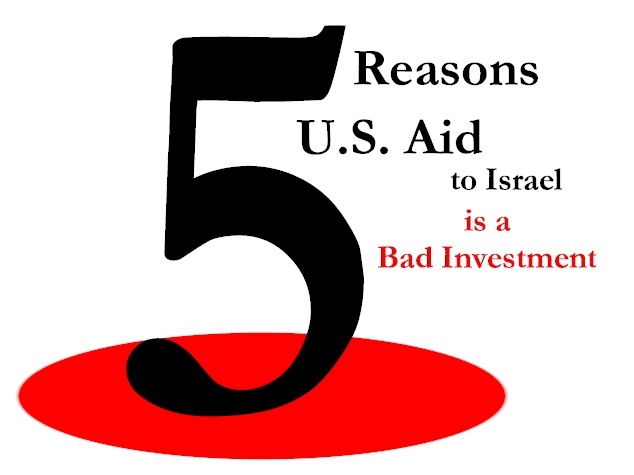…The majority of Americans, on the other hand, overwhelmingly oppose U.S. aid to Israel , according to polls fielded in 2014 and 2016. Growing numbers would rather boycott, divest and sanction Israel for its human rights abuses than provide the arms and blanket diplomatic support (commonly stipulated in these MOUs) that enable the abuses to continue. Beyond that, there are five lessor known reasons Americans should be actively opposing U.S. aid to Israel:
1. U.S. aid to Israel yields a huge negative return on investment
From a strictly green-eyeshade perspective, U.S. aid to Israel is a horrible investment. The late Harvard economist Thomas Stauffer in 2002 tallied the cost of Israel to the United States since 1973 to be $1.6 trillion. Stauffer included the oil crisis triggered by Arab governments in the aftermath of wars fought with Israel and other costs emanating from Israel’s violent repression of the Palestinians. Since Stauffer’s death in 2005, no other high-profile economist has taken up the thankless task of calculating such figures, though fresh data to feed such models has been piling up.
It is now the consensus view that America was attacked on 9/11 because of U.S. troops stationed in Saudi Arabia and unconditional U.S. support for Israel. The 9/11 attacks cost $3.3 trillion according to one conservative estimate. Israel lobbyists often claim that U.S. foreign aid to Israel is an investment that yields “dividends” and is therefore a “bargain.” If we assume aid is an investment and adjust for inflation, publicly known aid through 2011 is $233.6 billion. If we then assign unconditional U.S. support for Israel half the blame for motivating 9/11, an actual return on investment calculation is possible. The ROI of U.S. aid to Israel considering only half the costs of 9/11 is negative 806 percent. By any measure, this is an extremely poor return.
2. U.S. Aid to Israel is not a significant “U.S. jobs creator”
Many pundits are now spinning the proposed new MOU as a “U.S. jobs creator,” particularly in view of the pending restrictions against spending much of the aid in Israel. But how many jobs do military sales actually generate? Pitifully few. The top five military contractors, Lockheed Martin, Boeing, Raytheon, General Dynamics and Northrup Grumman claim to employ nearly a half-million, on annual 2015 revenues of just under a quarter trillion dollars. At $463,069 to support a single direct job, military equipment and service vendors employ many fewer employees per dollar of revenue than most other industries. Looking back, even if Israel spent 100 percent of its past ten-year $3.1 billion annual MOU dollars on “top shelf” U.S. military goods, like the Joint Strike fighter, it would have produced less than 7,000 direct U.S. jobs. More
08/11/2016 IRmep Briefing: Lawsuit to block US foreign aid to Israel

